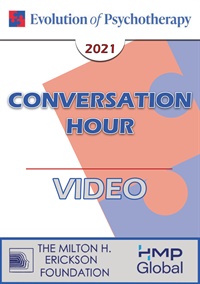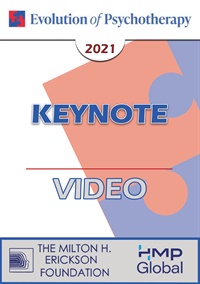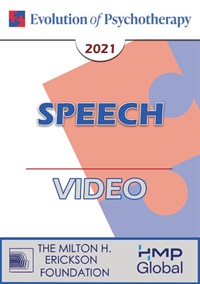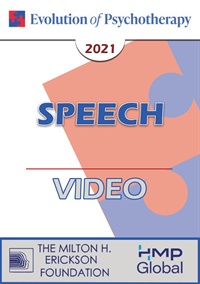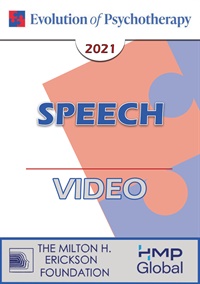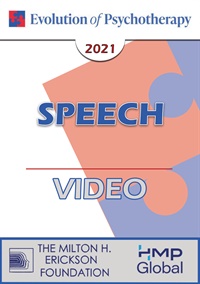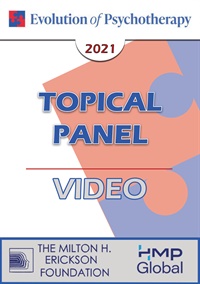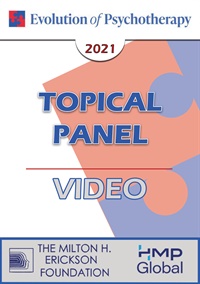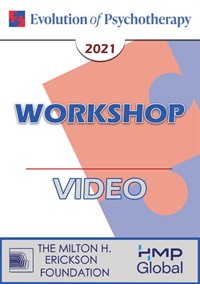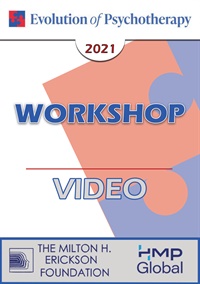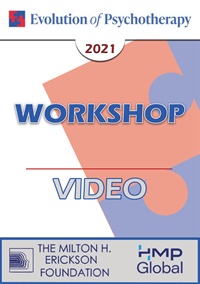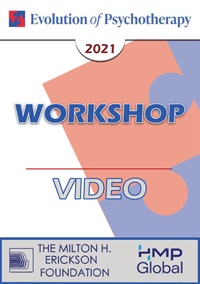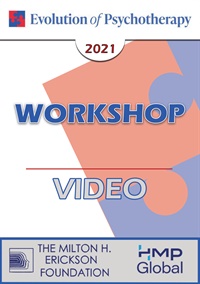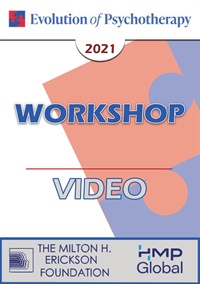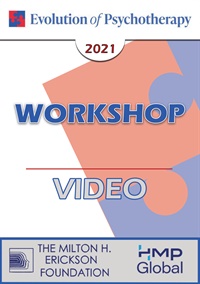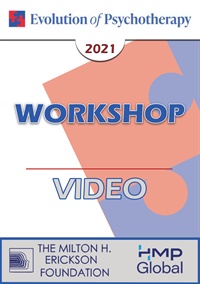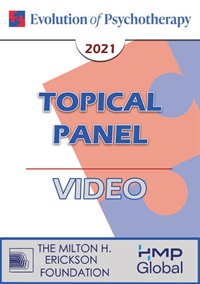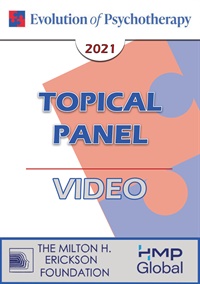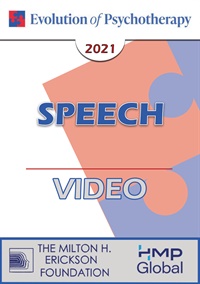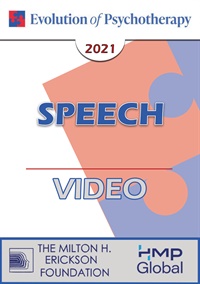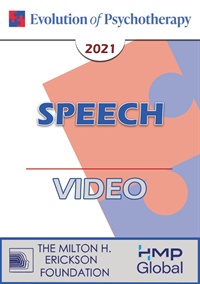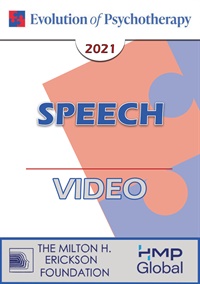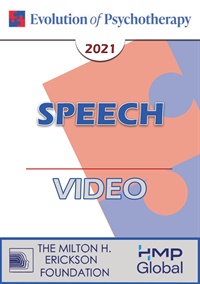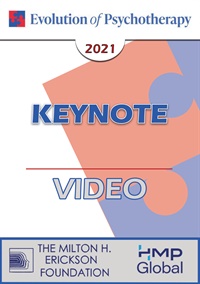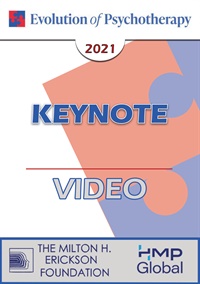- Average Rating:
- Not yet rated
- Topic Areas:
- Conversation Hours | Brief Therapy | Couples Therapy | Divorce | Relationships | Therapist Development
- Categories:
- Evolution of Psychotherapy | Evolution of Psychotherapy 2021 | Pioneers in Couples and Family Therapy
- Faculty:
- Michele Weiner-Davis, LCSW
- Course Levels:
- Master Degree or Higher in Health-Related Field
- Duration:
- 1 hour
- Format:
- Audio and Video
- Original Program Date:
- Dec 05, 2021
- Short Description:
- Michele Weiner-Davis shares what she’s learning from her latest work with couples facing infidelity and disconnection. She outlines a three-stage model for healing affairs, explores why desire discrepancies can quietly erode connection, and reflects on the shift toward longer, more immersive sessions. Grounded, hopeful, and highly practical, the session invites fresh thinking for therapists supporting couples on the brink.
- Price:
- $59.00 - Base Price
- Average Rating:
- Not yet rated
- Topic Areas:
- Keynotes | Therapist Development
- Categories:
- Evolution of Psychotherapy | Evolution of Psychotherapy 2021
- Faculty:
- Diane Ackerman, MFA, PhD
- Course Levels:
- Master Degree or Higher in Health-Related Field
- Duration:
- 1 hour
- Format:
- Audio and Video
- Original Program Date:
- Dec 05, 2021
- Short Description:
- Most of us feel reasonably intact and continuous, despite the constant commotion in our lives, our relationships, and our cells. But what exactly is a "Self?" In this talk I'll explore how the brain becomes the mind, and how it builds a sense of self (even a secret society of selves), to manage the everchanging mental fantasia in which we spend our days.
- Price:
- $59.00 - Base Price
Tags: Therapist Development
- Average Rating:
- Not yet rated
- Topic Areas:
- Speeches
- Categories:
- Evolution of Psychotherapy | Evolution of Psychotherapy 2021
- Faculty:
- Robert Dilts
- Course Levels:
- Master Degree or Higher in Health-Related Field
- Duration:
- 1 hour
- Format:
- Audio and Video
- Original Program Date:
- Dec 05, 2021
- Short Description:
- Creating lasting and ecological change frequently involves interventions on multiple interconnected levels such as: environment, behaviors, capabilities, beliefs, values, identity and sense of purpose. Working with these different levels involves different dynamics and produces a different degree of impact. It is important to have a road map and toolbox for how to influence clients at all of these levels. This session will explore the different types of processes and qualities of relationship that are necessary to produce change at multiple levels.
- Price:
- $59.00 - Base Price
- Average Rating:
- Not yet rated
- Topic Areas:
- Speeches
- Categories:
- Evolution of Psychotherapy | Evolution of Psychotherapy 2021 | Pioneers in Couples and Family Therapy
- Faculty:
- Ellyn Bader
- Course Levels:
- Master Degree or Higher in Health-Related Field
- Duration:
- 1 hour
- Format:
- Audio and Video
- Original Program Date:
- Dec 05, 2021
- Short Description:
- Dr. Ellen Bader reveals strategies for successfully working with your spouse, drawing from her 40-year experience of owning a business with her partner. She provides insights into managing professional and personal dynamics for couple-owned businesses, offering practical tools like the "Candor Solution" to enhance communication, decision-making, and mutual respect. Learn how to transform workplace challenges into opportunities for strengthening your relationship.
- Price:
- $59.00 - Base Price
Tags: Therapy Framework Behavioral Shifts Leadership in Relationships Entrepreneurial Challenges Interpersonal Dynamics Emotional Support Passionate Enterprise Business Ownership Work-Life Balance Commitment Conflict Management Negotiation Acknowledgement and Appreciation Business Partnership Couples Institute Decision Making Pandemic Impact Role Clarity
- Average Rating:
- Not yet rated
- Topic Areas:
- Speeches
- Categories:
- Evolution of Psychotherapy | Evolution of Psychotherapy 2021
- Faculty:
- Daniel Siegel
- Course Levels:
- Master Degree or Higher in Health-Related Field
- Duration:
- 1 hour
- Format:
- Audio and Video
- Original Program Date:
- Dec 05, 2021
- Short Description:
- In this presentation, we’ll examine the notion of “connection” and its correlation with mental health. When we feel disconnected from our inner life, we suffer; when we are disconnected relationally—from people and nature—we can become anxious, depressed, despondent. What is this powerful “connection” actually made of, what is it, and how can we take the science of connection and inform the practice of psychotherapy? In many ways, the experience of a separate, solo-self may underly the many challenges we face, from racism and social injustice to environmental destruction. The field of mental health can play a pivotal role in how we help our human family move toward a new way of living on Earth by addressing the modern cultural excessive focus on individuality in the separate sense of self.
- Price:
- $59.00 - Base Price
- Average Rating:
- Not yet rated
- Topic Areas:
- Speeches
- Categories:
- Evolution of Psychotherapy | Evolution of Psychotherapy 2021
- Faculty:
- Michael Yapko, PhD
- Course Levels:
- Master Degree or Higher in Health-Related Field
- Duration:
- 1 hour
- Format:
- Audio and Video
- Original Program Date:
- Dec 05, 2021
- Short Description:
- Mindfulness isn't a therapy in its own right, but its capacity for improving the quality of people's lives has received substantial empirical support as a class of meaningful interventions, particularly when embedded in a substantive therapeutic framework. Guided mindfulness meditation as a focusing strategy shares some key characteristics with clinical hypnosis, guided imagery, positive psychology, and other such focus-related approaches, but usually has a different aim in its application. This speech explores these overlaps when mindfulness is applied to a goal-oriented treatment process. This is NOT a speech about spiritual exploration with mindfulness. Rather, the focus is entirely on clinical applications of key aspects of mindfulness by deconstructing the hypnotic elements of such processes. We will identify the therapeutically relevant components of guided meditations, and how we can construct more meaningful interventions by incorporating them in novel ways.
- Price:
- $59.00 - Base Price
- Average Rating:
- Not yet rated
- Topic Areas:
- Topical Panels | Cognitive Psychology | Motivation | Neuro-Linguistic Programming (NLP) | Psychoanalysis | Resistance | Strategic Therapy | COVID
- Categories:
- Evolution of Psychotherapy | Evolution of Psychotherapy 2021 | Pioneers in Couples and Family Therapy
- Faculty:
- Robert Dilts, BA | Nancy McWilliams | Michael Miller | Cloe Madanes, HDL, LIC
- Course Levels:
- Master Degree or Higher in Health-Related Field
- Duration:
- 1 hour
- Format:
- Audio and Video
- Original Program Date:
- Dec 05, 2021
- Short Description:
- This panel explores diverse perspectives on resistance in therapy, featuring insights from leading experts. Dilts focuses on the relational aspect of resistance, while McWilliams draws from psychoanalytic theory to stress nonjudgmental responses. Miller explains how motivational interviewing reframes resistance as sustained talk and discord. Madanes offers a case study on using family dynamics to reduce resistance. The panel also addresses how COVID-19 has shaped client engagement and resistance in therapeutic settings.
- Price:
- $59.00 - Base Price
- Average Rating:
- Not yet rated
- Topic Areas:
- Topical Panels
- Categories:
- Evolution of Psychotherapy | Evolution of Psychotherapy 2021
- Faculty:
- Otto Kernberg, MD | Jeffrey Zeig, PhD | Scott Miller, PhD | Michael Miller
- Course Levels:
- Master Degree or Higher in Health-Related Field
- Duration:
- 1 hour
- Format:
- Audio and Video
- Original Program Date:
- Dec 05, 2021
- Short Description:
- The structure of initial interview from four different approaches will be described and discussed.
- Price:
- $59.00 - Base Price
- Average Rating:
- Not yet rated
- Topic Areas:
- Workshops
- Categories:
- Evolution of Psychotherapy | Evolution of Psychotherapy 2021
- Faculty:
- Robert Neimeyer
- Course Levels:
- Master Degree or Higher in Health-Related Field
- Duration:
- 2 hours
- Format:
- Audio and Video
- Original Program Date:
- Dec 05, 2021
- Short Description:
- When grief becomes painfully preoccupying and protracted, the problem often arises at the intersection of the death and the relationship it interrupted. Drawing on attachment-informed and Two-Track models of bereavement, we will begin by considering grieving as a process of reconstructing rather than relinquishing our bonds with those who have died, and the complicating circumstances that can interfere with this natural process. We then turn to a close analysis of a single session of therapy that releases an adult daughter from an anguishing grief that has persisted unchanged for many years, and that has insinuated itself into her life with intimate others. We begin this work by attending closely to "quality terms" in the client's narrative that poignantly convey the character of her connection with her mother, that symbolically signal the devastation caused by her death, and that function as harbingers of a more hopeful reconstructed relationship
- Price:
- $59.00 - Base Price
- Average Rating:
- Not yet rated
- Topic Areas:
- Workshops
- Categories:
- Evolution of Psychotherapy | Evolution of Psychotherapy 2021
- Faculty:
- Stephen Gilligan, PhD
- Course Levels:
- Master Degree or Higher in Health-Related Field
- Duration:
- 2 hours
- Format:
- Audio and Video
- Original Program Date:
- Dec 05, 2021
- Short Description:
- In psychotherapy, negative emotions are essential parts of a client's stuck places. This workshop focus on how to identify, welcome, and transform such difficult emotions, such that they become integral elements of a solution.
- Price:
- $59.00 - Base Price
- Average Rating:
- Not yet rated
- Topic Areas:
- Workshops
- Categories:
- Evolution of Psychotherapy | Evolution of Psychotherapy 2021
- Faculty:
- David Burns, MD
- Course Levels:
- Master Degree or Higher in Health-Related Field
- Duration:
- 2 hours
- Format:
- Audio and Video
- Original Program Date:
- Dec 05, 2021
- Short Description:
- Dr. Burns will show video clips and outcome data on the how and why of-rapid recovery from depression with TEAM-CBT .
- Price:
- $59.00 - Base Price
- Average Rating:
- Not yet rated
- Topic Areas:
- Workshops
- Categories:
- Evolution of Psychotherapy | Evolution of Psychotherapy 2021
- Faculty:
- Steven Hayes, PhD
- Course Levels:
- Master Degree or Higher in Health-Related Field
- Duration:
- 2 hours
- Format:
- Audio and Video
- Original Program Date:
- Dec 05, 2021
- Short Description:
- In this workshop I will show how to use a process-based therapy approach to guide intervention, based on a new form of process-based functional analysis. Using Acceptance and Commitment Therapy and an extended form of its psychological flexibility model I will show how idiographic analysis can be used to fit treatment kernels to client needs, rather than using protocols that target syndromes.
- Price:
- $59.00 - Base Price
- Average Rating:
- Not yet rated
- Topic Areas:
- Workshops | Couples Therapy | Psychodynamics
- Categories:
- Evolution of Psychotherapy | Evolution of Psychotherapy 2021 | Pioneers in Couples and Family Therapy
- Faculty:
- Ellyn Bader, PhD
- Course Levels:
- Master Degree or Higher in Health-Related Field
- Duration:
- 2 hours
- Format:
- Audio and Video
- Original Program Date:
- Dec 05, 2021
- Short Description:
- Bader presents strategies for managing infidelity crises in therapy, emphasizing direct engagement with conflict, addressing obsessive rumination constructively, and understanding the deeper meanings behind affairs. Using case examples, she highlights the importance of honesty, self-reflection, and confronting various types of lies to rebuild trust. Bader outlines therapeutic skills necessary for both partners—empowering the betrayed partner to find their voice, fostering self-esteem, and encouraging the betrayer to take accountability. She also addresses therapist neutrality, transparency, and navigating challenges like sexless marriages through honest and difficult conversations.
- Price:
- $59.00 - Base Price
- Average Rating:
- Not yet rated
- Topic Areas:
- Workshops
- Categories:
- Evolution of Psychotherapy | Evolution of Psychotherapy 2021
- Faculty:
- Stephen Gilligan, PhD
- Course Levels:
- Master Degree or Higher in Health-Related Field
- Duration:
- 2 hours
- Format:
- Audio and Video
- Original Program Date:
- Dec 04, 2021
- Short Description:
- Verbal conversations alone cannot produce sustainable change: somatic intelligence must be an integral part of sustainable change; verbal conversations are not sufficient. This workshop will experientially explore how to creatively use the related methods of Gendlen's "felt sense" and Gilligan's "relational trance".
- Price:
- $59.00 - Base Price
- Average Rating:
- Not yet rated
- Topic Areas:
- Workshops
- Categories:
- Evolution of Psychotherapy | Evolution of Psychotherapy 2021
- Faculty:
- Sue Johnson, EdD
- Course Levels:
- Master Degree or Higher in Health-Related Field
- Duration:
- 2 hours
- Format:
- Audio and Video
- Original Program Date:
- Dec 04, 2021
- Short Description:
- This workshop will teach the application of the EFT Tango - and show its use across three modalities - Individual, couple and family therapy. How the Tango process impacts depression and anxiety will be explicated. Clinical sessions will be viewed and experiential exercises offered.
- Price:
- $59.00 - Base Price
- Average Rating:
- Not yet rated
- Topic Areas:
- Workshops
- Categories:
- Evolution of Psychotherapy | Evolution of Psychotherapy 2021
- Faculty:
- Nancy McWilliams
- Course Levels:
- Master Degree or Higher in Health-Related Field
- Duration:
- 2 hour
- Format:
- Audio and Video
- Original Program Date:
- Dec 04, 2021
- Short Description:
- Dr. McWilliams will review ten different psychological lenses through which individual differences have been viewed (temperament, attachment style, observed clinical pattern, defensive structure, affective organization, implicit cognition, motivational tendencies, individual and cultural location on the self-definition versus self-in-relation polarity, central relational theme, level of severity of problem), emphasizing with clinical vignettes the practical value of appreciating each perspective. Intended to be directly relevant to participants' clinical work irrespective of their theoretical orientation or level of experience, this workshop welcomes case material and collaborative problem-solving.
- Price:
- $59.00 - Base Price
- Average Rating:
- Not yet rated
- Topic Areas:
- Topical Panels
- Categories:
- Evolution of Psychotherapy | Evolution of Psychotherapy 2021
- Faculty:
- Steven Hayes, PhD | Michael Yapko, PhD | Donald Meichenbaum, PhD
- Course Levels:
- Master Degree or Higher in Health-Related Field
- Duration:
- 1 hour
- Format:
- Audio and Video
- Original Program Date:
- Dec 04, 2021
- Short Description:
- Therapy happens in life, not just in the consulting room. Assignments facilitate treatment goals.
- Price:
- $59.00 - Base Price
- Average Rating:
- Not yet rated
- Topic Areas:
- Topical Panels | Relationships | Therapeutic Model | Couples Therapy
- Categories:
- Evolution of Psychotherapy | Evolution of Psychotherapy 2021 | Pioneers in Couples and Family Therapy
- Faculty:
- Ellyn Bader, PhD | Harville Hendrix, PhD | Helen LaKelly Hunt, PhD
- Course Levels:
- Master Degree or Higher in Health-Related Field
- Duration:
- 1 hour
- Format:
- Audio and Video
- Original Program Date:
- Dec 04, 2021
- Short Description:
- Three leading couples therapists discuss collaboration, communication techniques, and relationship healing. Dr. Ellen Bader explores therapist partnerships, while Harville Hendrix and Helen LaKelly Hunt present their Imago relationship therapy method. The panel examines creating safety in relationships, managing cultural differences, and promoting effective communication strategies that help couples transform their connections.
- Price:
- $59.00 - Base Price
- Average Rating:
- Not yet rated
- Topic Areas:
- Speeches
- Categories:
- Evolution of Psychotherapy 2021 | Evolution of Psychotherapy
- Faculty:
- Steven Hayes
- Course Levels:
- Master Degree or Higher in Health-Related Field
- Duration:
- 1 hour
- Format:
- Audio and Video
- Original Program Date:
- Dec 04, 2021
- Short Description:
- In this talk, Dr. Steven Hayes will claim that most key psychological concepts that have entered into our cultural mainstream contain within them a core conceptual and methodological flaw that makes application of these concepts inappropriate and invalid. Dr. Hayes will explain the error and show how it limits the good that psychology can do for the world. He will then examine a small number of areas of research where significant progress has been made by correcting the problem.
- Price:
- $59.00 - Base Price
- Average Rating:
- Not yet rated
- Topic Areas:
- Speeches
- Categories:
- Evolution of Psychotherapy | Evolution of Psychotherapy 2021
- Faculty:
- Jean Shinoda Bolen
- Course Levels:
- Master Degree or Higher in Health-Related Field
- Duration:
- 1 hour
- Format:
- Audio and Video
- Original Program Date:
- Dec 04, 2021
- Short Description:
- First half of life is about adaptation to gender and social norms and expectations at which a person succeeds or fails. Midlife raises the question: is this all there is? What now? What next/ A time for questions about the meaning and purpose of life, about responses to suffering and loss, creative expression, spiritual insights.
- Price:
- $59.00 - Base Price
- Average Rating:
- Not yet rated
- Topic Areas:
- Speeches | Addiction | Co-Occurring Disorders | Family Systems
- Categories:
- Evolution of Psychotherapy | Evolution of Psychotherapy 2021 | Pioneers in Couples and Family Therapy
- Faculty:
- Claudia Black, PhD
- Course Levels:
- Master Degree or Higher in Health-Related Field
- Duration:
- 1 hour
- Format:
- Audio and Video
- Original Program Date:
- Dec 04, 2021
- Short Description:
- Working with the young adult with addictive disorders most frequently involves addressing the experience of bullying, physical and sexual abuse, emotional abandonment and loss. These dynamics are significant in addressing the more frequent co-occurring disorders of anxiety and depression. This presentation will also offer a framework for treatment strategies.
- Price:
- $59.00 - Base Price
- Average Rating:
- Not yet rated
- Topic Areas:
- Speeches | Couples Therapy | IMAGO | Relational Neuroscience | Therapeutic Process
- Categories:
- Evolution of Psychotherapy | Evolution of Psychotherapy 2021 | Pioneers in Couples and Family Therapy
- Faculty:
- Harville Hendrix | Helen LaKelly Hunt, PhD
- Course Levels:
- Master Degree or Higher in Health-Related Field
- Duration:
- 1 hour
- Format:
- Audio and Video
- Original Program Date:
- Dec 04, 2021
- Short Description:
- This presentation introduces a relational approach to building conscious partnerships, emphasizing the “space between” individuals as key to creating safety and connection. Core practices include structured Imago Dialog, mirroring, validation, and daily affirmations to strengthen empathy and reduce polarization. The session concludes with a Q&A on enhancing validation, problem-solving, and deepening emotional bonds through empathy.
- Price:
- $59.00 - Base Price
- Average Rating:
- Not yet rated
- Topic Areas:
- Speeches
- Categories:
- Evolution of Psychotherapy | Evolution of Psychotherapy 2021
- Faculty:
- Peter Levine
- Course Levels:
- Master Degree or Higher in Health-Related Field
- Duration:
- 1 hour
- Format:
- Audio and Video
- Original Program Date:
- Dec 04, 2021
- Short Description:
- WHAT IS TRUER THAN TRUTH. ANSWER: THE STORY. AN UNSUSPECTING AND RELUCTANT PROPHET. WE ALL HAVE OUR STORIES TO TELL, AND THIS IS MINE. IT IS MY TRUTH.
- Price:
- $59.00 - Base Price
- Average Rating:
- Not yet rated
- Topic Areas:
- Keynotes | Positive Psychology | Psychology
- Categories:
- Evolution of Psychotherapy | Evolution of Psychotherapy 2021
- Faculty:
- Martin Seligman, PhD
- Course Levels:
- Master Degree or Higher in Health-Related Field
- Duration:
- 1 hour
- Format:
- Audio and Video
- Original Program Date:
- Dec 04, 2021
- Short Description:
- Well Being remains, in spite of Covid’s interruption, a plausible personal, corporate and planetary goal. I review the Age of Progress until Covid along with the barriers to continued progress. The belief in individual and collective Agency will determine our future. Efficacy, Optimism, and Imagination, the three parts of agency can be taught in the clinic, the classroom, and the corporation. Juliana of Norwich (1365) will be our beacon.
- Price:
- $59.00 - Base Price
- Average Rating:
- Not yet rated
- Topic Areas:
- Keynotes | Multicultural
- Categories:
- Evolution of Psychotherapy | Evolution of Psychotherapy 2021
- Faculty:
- Derald Wing Sue, PhD
- Course Levels:
- Master Degree or Higher in Health-Related Field
- Duration:
- 1 hour
- Format:
- Audio and Video
- Original Program Date:
- Dec 04, 2021
- Short Description:
- "Sometime between the years 2030 and 2050 Black, Indigenous and People of Color (BIPOC) will become a numerical majority in society. It will become increasingly difficult for mental health professionals, and educators not to encounter clients and students who differ from them in terms of race, ethnicity and culture. Difficult dialogues on race and other sociodemographic identities (gender, sexual orientation or identity) have often served to polarize and obstruct mutual understanding rather than to clarify and increase mutual understanding. Most well intentioned people (mental health providers, educators and others) find themselves ill prepared to deal with the often-explosive race or gender related emotions that manifest themselves in interpersonal interactions and in employment and other public spaces.
- Price:
- $59.00 - Base Price
Tags: Multi-Cultural


